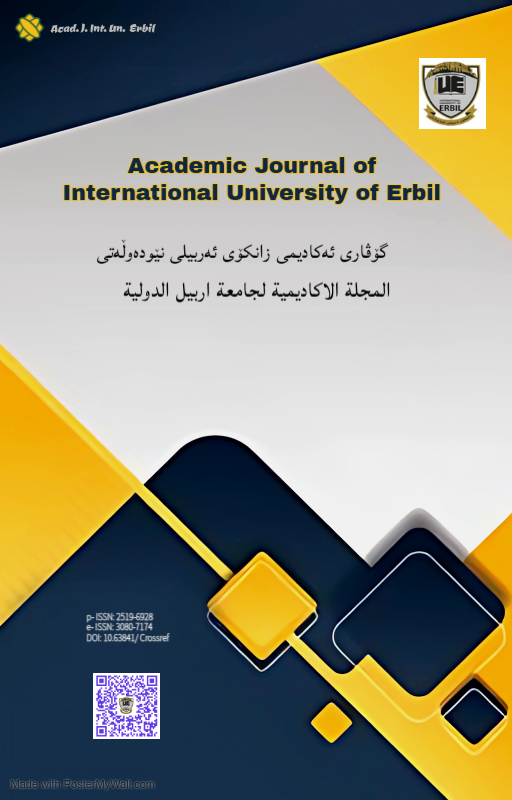The Impact of Terrorism and Governance on Economic Growth in Iraq: Evidence from 2004 to 2024
Impact of Terrorism and Governance on Economic Growth in Iraq
DOI:
https://doi.org/10.63841/iue23562Keywords:
Terrorism, Governance, Economic Growth, Oil Revenues4, Government ExpenditureAbstract
This study analyzes the complex interactions among terrorism, governance, and economic growth in Iraq during a two-decade span (2004–2024). The research uses diverse econometric models, such as Granger Causality, Co-integration, and Vector Autoregression (VAR), to examine the effects of political stability, government expenditure, oil revenues, and terrorism on Iraq's economic performance. The results indicate a substantial inverse correlation between terrorism and economic growth, with increased terrorist activity resulting in pronounced decreases in GDP, oil revenues, and general economic performance. Governance, marked by low political stability and fragile institutional frameworks, intensifies the adverse impacts of terrorism, obstructing economic development. The research underscores the necessity of diversifying Iraq's economy beyond oil reliance and tackling income disparity to promote sustained stability and progress. The findings provide critical insights for policymakers, highlighting the necessity for extensive reforms that enhance governance, mitigate terrorism, and foster sustainable economic development in Iraq.
Downloads
References
S. B. Blomberg, G. D. Hess, and A. Orphanides, "The macroeconomic consequences of terrorism," Journal of Monetary Economics, vol. 51, no. 5, pp. 1007–1032, 2004.
M. Ali, "Terrorism and economic growth in post-conflict countries," Int. J. Econ. Dev., vol. 12, no. 1, pp. 33–50, 2019.
C. Davis and P. Thompson, "The role of political stability in fostering economic recovery in the Middle East," Glob. Econ. Rev., vol. 45, no. 2, pp. 98–112, 2021.
R. Farhan and F. Ibrahim, "Corruption and governance in Iraq: Effects on economic performance," Middle Eastern Econ. J., vol. 32, no. 4, pp. 234–249, 2018.
H. Mohammed, "Public expenditure and its impact on economic recovery in Iraq," J. Public Econ., vol. 40, pp. 176–190, 2017.
World Bank, World Development Indicators 2024, World Bank Group, Washington, D.C., 2024. [Online]. Available: https://data.worldbank.org/
United Nations Development Programme (UNDP), Human Development Report 2023, UNDP, New York, 2023. [Online]. Available: https://hdr.undp.org/
S. K. Gupta and R. Singh, "Economic recovery after conflict: Lessons from Iraq," J. Econ. Perspect., vol. 51, no. 2, pp. 89–101, 2020.
J. L. Green and A. P. Brown, "Security, governance, and economic growth in Iraq," Int. Relat. Dev., vol. 37, no. 1, pp. 45–67, 2022.
N. A. Hussain, "Assessing the role of foreign direct investment in post-conflict economic development," Glob. Finance J., vol. 19, pp. 201–216, 2021.
E. W. Smith and L. J. Lee, "Economic effects of oil revenue volatility in conflict economies: A case study of Iraq," Energy Econ. J., vol. 48, pp. 232–245, 2022.
International Monetary Fund (IMF), Iraq: Economic Outlook and Policy Recommendations 2023, IMF, Washington, D.C., 2023. [Online]. Available: https://www.imf.org/
A. L. Taylor and J. O. Roberts, "The link between governance quality and economic growth in the Middle East," Glob. Gov. Stud., vol. 27, pp. 87–105, 2020.
M. T. Jenkins and S. L. Harris, "The impact of terrorist activities on long-term economic growth in conflict-ridden nations," J. Conflict Econ., vol. 14, no. 2, pp. 189–207, 2018.
H. L. Majeed, H. O. Mohammed, and B. M. Qadir, "Evaluating the petroleum contracts of Kurdistan Region in the surveying and applying the Deloitte data (A comparative review)," Int. J. Multicultural Multireligious Understand., vol. 8, no. 7, pp. 1–11, 2021.
Downloads
Published
Issue
Section
License
Copyright (c) 2025 Academic Journal of International University of Erbil

This work is licensed under a Creative Commons Attribution-NonCommercial-NoDerivatives 4.0 International License.












